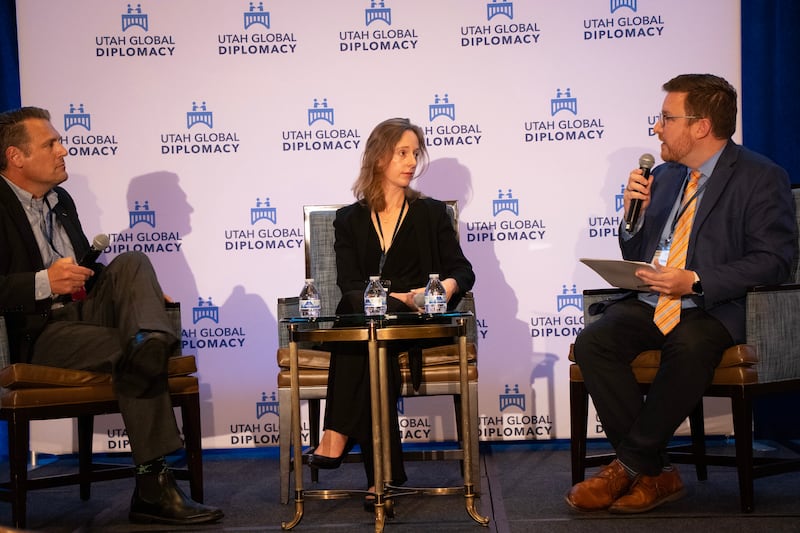Global technological innovation is moving at lightning speed, and Utah is fortunate to have a front row seat. Air taxis may soon be dotting the skies along the Wasatch Front. The leap of GPT-5 has moved society that much closer to artificial general intelligence (AGI). Quantum computing may crack the secure barriers of modern encryption in the next decade. These advances are now everyday headlines across the globe and part of household conversations here in Utah.
As the pace of innovation increases, new security risks emerge. These risks are at the forefront of political, academic and industry conversations. In July, this topic took center stage here in Utah at the Diplomacy Begins Here: National Security and Emerging Technologies Summit. This one-of-a-kind gathering brought together local and national leaders across sectors and industries to explore conflicts, collaborations and commercialization of emerging technologies, along with their impact on the advancement of national security.
The rapid evolution of technology and security requires businesses and governments to adapt in real time. Anticipatory intelligence, cybersecurity and artificial intelligence, biotechnology, nuclear energy, robotics, and aerospace technology are just several industries that have a strong and growing presence in Utah’s innovation ecosystem. Forward-thinking groups like Summit V, Utah Office of Energy Development - Advanced Nuclear, Utah State University’s Center for Anticipatory Intelligence, 47G, Denali Therapeutics, and Northstar Photonics are driving forces behind globally recognized solutions. As a result, Utah is becoming a hub for tech diplomacy: a dynamic concept that’s rapidly reshaping how nations, corporations and civil society interact on the global stage.
Utah has and will continue to lead out in tech diplomacy as we prepare to host the 2034 Olympic and Paralympic Winter Games. During the summit, Darren Hughes, vice president of operations and planning for Utah’s Olympic Organizing Committee, highlighted security preparations that are underway for one of the world’s largest diplomatic events. Olympic games represent more than global athletic competition; they are a convergence of security, innovation and diplomacy. As Utah prepares to welcome athletes and dignitaries from across the world, the state must be prepared to meet the high-stakes demands of cybersecurity, digital identity management, predictive threat detection and safe infrastructure. In accomplishing these expectations, Utah has the opportunity to showcase its leadership in both technological innovation and diplomacy.

Utah as a tech leader
Utah, home to Silicon Slopes, has already established itself as a leader in emerging technologies, home to cutting-edge companies and researchers working in artificial intelligence, energy, cybersecurity, and biotechnology. But with new technologies comes new rules of engagement, especially on a global scale, and Utah policymakers are leading the way. Utah Representative Doug Fiefia was recently appointed to the National Task Force on State AI Policy, where he will guide the development of responsible AI governance at the state level with national and global implications.
Through private investment into local innovation, building partnerships between foreign nations and homegrown tech companies, and establishing Utah’s innovators as a trustworthy resource, could Utah’s political leaders and tech companies advance tech diplomacy?
Utah’s tech talent pipeline
Tech diplomacy isn’t only about policy — it’s about people. And Utah’s people are among the most globally minded and professionally prepared in the nation.
Utah’s workforce is already uniquely positioned for global engagement. One in five jobs in our state is tied to international relations or foreign trade. In Utah, you can find 131 languages spoken, which reflects our deep cultural resources and global connectivity. This makes Utah not only ripe for international talent, but a source of it.
Our colleges and universities are producing extraordinary talent equipped to lead on the global stage. From the pioneering work at the Utah State University Center for Anticipatory Intelligence, to the Utah Valley University’s Center for National Security Studies, to the internationally focused Kennedy Center for International Studies at Brigham Young University, our academic institutions are shaping the future of tech, diplomacy and world affairs.

These centers prepare students to thrive in the world. They train students to think critically about how technology intersects with global security, ethics and governance. They cultivate the skills necessary to anticipate global challenges and form international partnerships that expand Utah’s influence far beyond our state’s boundaries.
Utah leads in good governance
States like Utah can build cybersecure infrastructure, ensure the integrity of public services, maintain resilient energy grids, develop biotechnology, and invent new robotics like air taxis. Our ecosystem brings together state agencies, private industry, universities and nonprofits in meaningful collaboration. These partnerships allow us to:
- Pilot and scale secure, democratic technologies that protect critical infrastructure;
- Build systems that enhance public trust in governance and civic participation;
- And respond nimbly to global challenges with community-driven, ethically grounded solutions.
In Utah, public-private partnerships and good governance are fundamental and integrated into our way of doing business. This exemplifies tech diplomacy in action.
Additionally, Utah’s cultural values — rooted in service, integrity and a deep sense of community — serve as a model for responsible innovation, shaping human-centered tech policy that leaves no one behind and educates the next generation of citizen diplomats and global tech leaders.
Utah’s time to lead tech diplomacy is now
While rapid technological innovation has caught some industries and governments by surprise, Utah has and will continue to lead out. As debated and discussed at Utah Global Diplomacy’s National Security and Emerging Technologies Summit, Utah’s tech leadership, talent pipeline, and focus on good governance set our state apart on the national and international stage. By embracing the principles of tech diplomacy, we’re not just reacting to change — we’re leading it.


